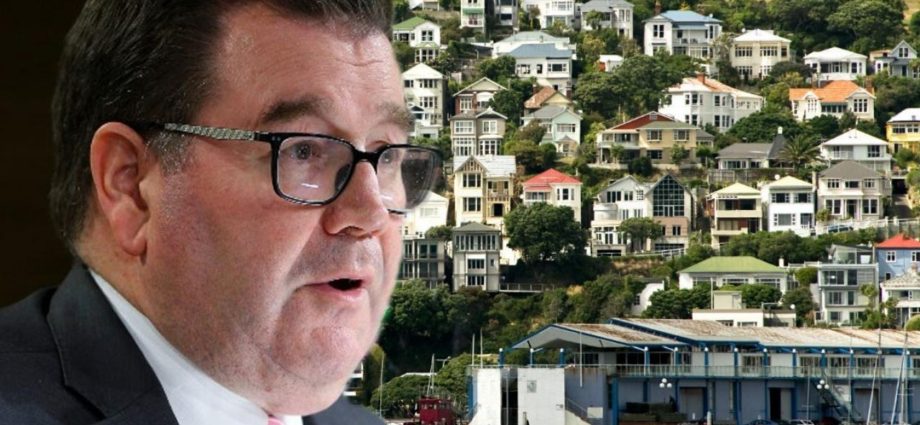PHOTO: Finance Minister Grant Robertson. FILE
This year’s Budget is one of the hardest Finance Minister Grant Robertson has had to put together, according to RNZ’s political editor Jane Patterson.
With an international backdrop of the economic risk posed by Russia’s invasion of Ukraine and the potential emergence of further Covid-19 variants, the government is also under pressure to address the day-to-day concerns of many New Zealanders.
A focus on tackling the increasing costs of living – the price of essentials like food, fuel and accommodation are all on the rise – is expected.
See how Budget 2022 unfolds in relation to real estate in New Zealand:

Ministers on their way to deliver the 2022 Budget earlier today credit: RNZ / Angus Dreaver
Inflation came in at 6.9 percent in the year to March, a 30-year high which the Government has blamed on global COVID-19 supply chain issues as well the war in Ukraine. It’s led to a significant jump in food and petrol prices, hurting Kiwis in the wallet.
- More than two million New Zealanders will get a one-off $350 sweetener as part of the Budget’s centrepiece $1 billion cost-of-living relief package. The temporary short-term support is counterbalanced by a record $11.1b for the health system as the government scraps DHBs and replaces them with a central agency.
- Over three months, $27 a week will be given to an estimated 2.1 million Kiwis earning up to $70,000 and not eligible for the Winter Energy Payment. It will be paid in three monthly instalments, from August 1, and is expected to cost $814 million.
- The Warmer Kiwi Homes programme, which support New Zealanders with insulation and heating retrofits, will receive a $73 million extension to run until June 2024. That will see an additional 26,500 retrofits, which the Government says will help lower power bills.
- There’s also help for first-home buyers. The Government is changing the eligibility criteria for state-assisted first home loans and first home grants, to recognise the changes in house prices over the past year.
“We are also removing house price caps entirely from the first home loan, to provide a greater choice of homes for prospective buyers,” said Housing Minister Megan Woods.
“Income caps and lender requirements are sufficient to ensure that the first home loan is used by buyers who need support for a home.”
Woods said it’s estimated the changes will help thousands more first home buyers, with funding available for approximately 7000 extra first home grants and 2500 extra first home loans every year.
It comes despite house prices cooling off as the Reserve Bank tightens lending requirements and bumps up interest rates in the wake of COVID-19 stimulus. Treasury forecasts house prices to drop 1.2 percent in 2023 after rising around 30 percent last year.
NOTE:
- Introduction of an ‘individual earner with dependents category’ with an income cap of $150,000
- Adjusting the KiwiSaver requirements to reduce the threshold amount of regular savings to access the grant
- Allowing relocatable homes that have received a Code of Compliance certificate in the last 12 months to qualify as new properties
- Enabling members of Progressive Home Ownership rent-to-buy schemes to access the new build grant
What else was announced?
- $200 million for Maori education
- $116 million for Whanau Ora
- $155 million for the Maori economy and employment
- $151.4 million for cultural sector resilience
- More than $185 million for cultural sector resilience
- More than $28 million to improve the coronial system and reduce delays
- $100 million for disability services, including establishment of Ministry for Disabled People
- $118.4 million for advisory services to support farmers, foresters, growers and Maori owners with shift to sustainable land use
- $40 million to help transform the forestry, wood processing, food and beverage and fisheries sectors
- $327 million over three years to merge RNZ and TVNZ
- $178.7 million to help councils transition to new Resource Management Act planning rules to help get more houses built
- $40.7 million over four years to invest in vaccine research and development
- $13.7 million to implement the Government’s commitment to deliver a Dawn Raids historical account for the Pacific community
- $18.3 million to support Pacific people into more education and employment opportunities
- $20 million for diabetes prevention targeted at Pacific communities in south Auckland
- $50 million for the Pacific Provider Development Fund to help Pacific providers adapt to the new health reforms
What’s already been announced?
- New fiscal responsibility rules with a new debt cap
- $88 million to help improve school attendance
- $600 million for police to target gangs
- $114.5 million to tackle family violence
- $230 million to support more apprentices
- $110.9 million for biosecurity
- $86.5 million across four years for better access to driver licences
- $90 million for mental health to expand Mana Ake services (mental health programme for school students)
- $20 million over four years towards Digital Technologies Industry Transformation Plan (ITP)
- $15 million for youth services

















